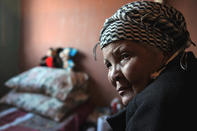Poverty as a Stressor
Food insufficiency is a state when a person does not have enough food to eat either ‘sometimes, or often’, according to Dr Katherine Sorsdahl and others in an article on the relationship between mental illness and food shortages in households. It is a state where someone is food insecure and experiences hunger.

People living this close to hunger are already likely to exist in a state of poverty, which comes with its own stressors and anxieties. To be food insecure (precisely, to have ‘limited or uncertain availability’ of good, safe food, or exist in a mental space where there is uncertainty about being able to get hold of that food in a socially acceptable way) or to live with the distress of hunger, or the fear of hunger, is likely to push someone further into a state of diagnosable mental disorder.
Sorsdahl, from Groote Schuur Hospital in Cape Town, writes that ‘uncertainty about the availability of food, whether or not food insufficiency actually occurs, may affect the individual’s social and mental well-being by creating feelings of aggravation, worry and depression concerning their food supplies’.
For instance, one study in Canada showed that ‘food-insufficient households had significantly higher odds of not only reporting poor/fair health, of having poor functional health, restricted activity and multiple chronic conditions, but were also more likely to be suffering from major depression and symptoms of distress’.
Links Between Food Shortages and Depression
In a series of face-to-face interviews with a number of South Africans living in various communities, 38% of the households were found to have an insufficiency of food.
In these households, food shortage was linked to an increased likelihood of having an anxiety disorder such as a panic disorder or generalised anxiety, and there was a significant number of substance abuse problems, which also fall into the same diagnostic realm as the anxiety disorders.
While Sorsdahl’s study did not show a link with depression and food shortages, the authors maintain that other studies have done so. And since anxiety and depression often occur together in an individual, the researchers argue that it would not be surprising if further research in the South African population did show a link between food shortages and depression, not just anxiety and substance abuse.
What comes out of this study is this: you cannot necessarily tackle all the worst hardships of poverty, the kinds of things that will already increase a person’s risk of developing a mental disorder. If shortages of food contribute even further to mental illness, then ‘preventing it might reduce the risk of onset or recurrence’ of mental health conditions, which are costly to treat and disabling for the people suffering from the illnesses.
Sorsdahl’s conclusion is that because there is a distinct relationship between food insufficiency and mental health, then the first line of defence against some of the common mental disorders might require interventions as simple as getting more good, wholesome food into people’s homes.
No Food to Eat Today
This is not to say that one man, Mazondo, or his family suffer from depression or anxiety or have turned to alcohol to ameliorate the pains of a poor existence. But it does say that if any of them did, it would not be surprising. But for now, Mazondo has had his say. He has not eaten yet today and he says there is no more food in the house so he might not eat later, either.
Behind him, though, a tubby cast-iron pot has been planted above a spray of coals in the empty shell of a building at the bottom of his erf. The derelict building belongs to the neighbours, but Khangezule uses it as her outdoor kitchen.
Here, she bends to stir a thin ivory mealie meal porridge, which issues forth an occasional pop as a small bubble of steam erupts volcanically and sighs back down into the liquid. During the conversation, Mazondo repeatedly says there is no food to eat today, in spite of this huge soup of mealie meal boiling over the coals, suggesting that this staple is something of a blank canvas which still needs the richness of spinach, meat or pumpkin to bring it to life.
When he is asked what will be on the dinner table that night, he indicates it will be a large bowl of pap. Nothing else. No flavouring, no seasoning, no meat, vegetables or fruit to follow. Only when a neighbour gives him a punnet of slightly mouldy courgettes and some mushrooms does it look like there is a promise of some colour being added to the otherwise bland and empty meal.
Mazondo gets up from his chair under the avocado tree and says he is tired, he plans to go back to sleep now. There is not much else for him to do until the town has its next big party and the beer cans start clattering to the pavements once more for him to collect. Meanwhile, his children carry on bouncing around the dirt yard, burning off the sugar they had for breakfast, seeming to have forgotten their half-empty bellies for now.
By Leonie Joubert